| Listing 1 - 9 of 9 |
Sort by
|
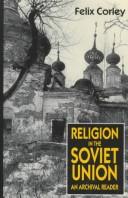
ISBN: 9780814715390 0814715397 Year: 1996 Publisher: New York: New York University press,
Abstract | Keywords | Export | Availability | Bookmark
 Loading...
Loading...Choose an application
- Reference Manager
- EndNote
- RefWorks (Direct export to RefWorks)
Book
ISBN: 0710305222 Year: 1996 Publisher: London ; New York : New York (N.Y.) : Kegan Paul International ; Distributed by Columbia University Press,
Abstract | Keywords | Export | Availability | Bookmark
 Loading...
Loading...Choose an application
- Reference Manager
- EndNote
- RefWorks (Direct export to RefWorks)
Coronations --- Emperors --- Rites and ceremonies --- Daijōsai. --- Religion and state --- Succession
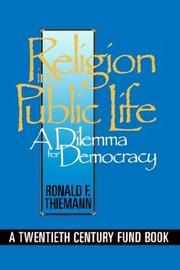
ISBN: 0585202559 9780585202556 0878406093 0878406107 9780878406098 9780878406104 1589018222 9781589018228 Year: 1996 Publisher: Washington, D.C. : Georgetown University Press,
Abstract | Keywords | Export | Availability | Bookmark
 Loading...
Loading...Choose an application
- Reference Manager
- EndNote
- RefWorks (Direct export to RefWorks)
Prayer in public schools, abortion, gay and lesbian rights - these bitterly divisive issues dominate American politics today, revealing deep disagreements over basic moral values. In a highly readable account that draws on legal arguments, political theory, and philosophy, Ronald F. Thiemann explores the proper role of religious convictions in American public life. He proposes that religion can and should play an active, positive part in our society even as it maintains a fundamental commitment to pluralist, democratic values. Arguing that both increased secularism and growing religious diversity since the 1960s have fragmented commonly held values, Thiemann observes that there has been an historical ambivalence in American attitudes towards religion in public life. He proposes abandoning the idea of an absolute wall between church and state and all the conceptual framework built around that concept in interpreting the First Amendment. He returns instead to James Madison's views and the Constitutional principles of liberty, equality, and toleration. Refuting both political liberalism (as too secular) and communitarianism (as failing to meet the challenge of pluralism), Thiemann offers a new definition of liberalism that gives religions a voice in the public sphere as long as they heed the Constitutional principles of liberty, equality, and toleration or mutual respect. The American republic, Thiemann notes, is a constantly evolving experiment in constructing a pluralistic society from its many particular communities. Religion can act as a positive force in its moral renewal, by helping to shape common cultural values. All those interested in finding solutions to today's divisive political discord, in finding ways to disagree civilly in a democracy, and in exploring the extent to which religious convictions should shape the development of public policies will find that this book offers an important new direction for religion and the nation.
Democracy --- Religion and state --- Religion and politics --- Christianity and democracy --- Religious aspects --- Christianity. --- United States --- Politics and government. --- Politics and government --- Religion. --- Religion --- Government --- History, Political
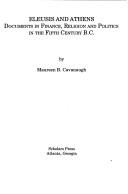
ISBN: 0788500317 0788500325 9780788500312 9780788500329 Year: 1996 Volume: 35 Publisher: Atlanta (Ga.): Scholars Press,
Abstract | Keywords | Export | Availability | Bookmark
 Loading...
Loading...Choose an application
- Reference Manager
- EndNote
- RefWorks (Direct export to RefWorks)
Eleusinian mysteries. --- Inscriptions, Greek --- Religion and state --- Harvesting --- Demeter (Greek deity) --- Eleusis, Mystères d' --- Inscriptions grecques --- Religion et Etat --- Récolte --- Déméter (Divinité grecque) --- Religious aspects --- Cult. --- Aspect religieux --- Culte --- Religious aspects. --- Eleusinian mysteries --- -Religion and state --- -Harvesting --- -Demeter (Greek deity) --- Crops --- Agriculture --- State and religion --- State, The --- Greek inscriptions --- Greek language --- Greek philology --- Cults --- Mysteries, Religious --- Cult --- -Religious aspects --- Eleusis, Mystères d' --- Récolte --- Déméter (Divinité grecque) --- Inscriptions, Greek - Greece - Athens. --- Religion and state - Greece - Athens. --- Harvesting - Greece - Athens - Religious aspects. --- Demeter (Greek deity) - Cult. --- Éleusis, Mystères d' --- Demeter (divinité grecque) --- Religion et État --- Grèce --- Athènes (Grèce) --- 5e siècle av. J.-C. --- Histoire --- Sources
Book
ISBN: 2213596697 Year: 1996 Publisher: Paris : Fayard,
Abstract | Keywords | Export | Availability | Bookmark
 Loading...
Loading...Choose an application
- Reference Manager
- EndNote
- RefWorks (Direct export to RefWorks)
Philosophy, Renaissance --- Political science --- Religion and politics --- Religion and state --- Political ethics --- Philosophie de la Renaissance --- Science politique --- Religion et politique --- Religion et Etat --- Morale politique --- Philosophy --- Early works to 1800 --- Philosophie --- Ouvrages avant 1800 --- Early works to 1800.
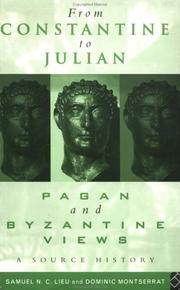
ISBN: 0415093368 9780415093361 Year: 1996 Publisher: London: Routledge,
Abstract | Keywords | Export | Availability | Bookmark
 Loading...
Loading...Choose an application
- Reference Manager
- EndNote
- RefWorks (Direct export to RefWorks)
Church and state --- Church history --- Religion and state --- History --- State and religion --- State, The --- Christianity and state --- Separation of church and state --- State and church --- Religious aspects --- Rome --- Rim --- Roman Empire --- Roman Republic (510-30 B.C.) --- Romi (Empire) --- Byzantine Empire --- Rome (Italy) --- Religion --- Sources --- Religion and state - Rome - History - Sources --- Church and state - Rome - History - Sources --- Church history - Primitive and early church, ca. 30-600 - Sources --- Rome - Religion - Sources --- Rome - History - Constantines, 306-363 - Sources --- Rome - History - Empire, 284-476 - Sources
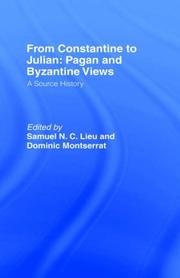
ISBN: 1134871198 1280321687 0585453128 0203422058 9780585453125 9780203422052 9780415093354 041509335X 9780415093361 0415093368 9786610321681 661032168X 9781134871148 9781134871186 9781134871193 113487118X Year: 1996 Publisher: London ; New York : Routledge,
Abstract | Keywords | Export | Availability | Bookmark
 Loading...
Loading...Choose an application
- Reference Manager
- EndNote
- RefWorks (Direct export to RefWorks)
Provides students with important source material covering an age of major transition in Europe - the establishment of Rome as a Christian empire. Most of the material was previously unavailable in English.
Religion and state --- Church and state --- Church history --- Christianity and state --- Separation of church and state --- State and church --- State, The --- State and religion --- History --- Religious aspects --- Rome --- Rim --- Roman Empire --- Roman Republic (510-30 B.C.) --- Romi (Empire) --- Byzantine Empire --- Rome (Italy) --- Religion

ISBN: 0878406107 0878406093 Year: 1996 Publisher: Washington, DC Georgetown University Press
Abstract | Keywords | Export | Availability | Bookmark
 Loading...
Loading...Choose an application
- Reference Manager
- EndNote
- RefWorks (Direct export to RefWorks)
Prayer in public schools, abortion, gay and lesbian rights - these bitterly divisive issues dominate American politics today, revealing deep disagreements over basic moral values. In a highly readable account that draws on legal arguments, political theory, and philosophy, Ronald F. Thiemann explores the proper role of religious convictions in American public life. He proposes that religion can and should play an active, positive part in our society even as it maintains a fundamental commitment to pluralist, democratic values. Arguing that both increased secularism and growing religious diversity since the 1960s have fragmented commonly held values, Thiemann observes that there has been an historical ambivalence in American attitudes towards religion in public life. He proposes abandoning the idea of an absolute wall between church and state and all the conceptual framework built around that concept in interpreting the First Amendment. He returns instead to James Madison's views and the Constitutional principles of liberty, equality, and toleration. Refuting both political liberalism (as too secular) and communitarianism (as failing to meet the challenge of pluralism), Thiemann offers a new definition of liberalism that gives religions a voice in the public sphere as long as they heed the Constitutional principles of liberty, equality, and toleration or mutual respect. The American republic, Thiemann notes, is a constantly evolving experiment in constructing a pluralistic society from its many particular communities. Religion can act as a positive force in its moral renewal, by helping to shape common cultural values. All those interested in finding solutions to today's divisive political discord, in finding ways to disagree civilly in a democracy, and in exploring the extent to which religious convictions should shape the development of public policies will find that this book offers an important new direction for religion and the nation.
Values --- Church and state --- Valeurs (Philosophie) --- Eglise et Etat --- Democracy --- Religion and state --- Religion and politics --- Religious aspects --- Christianity. --- United States --- Politics and government. --- Politics and government --- Religion. --- Religion --- Christianity --- 1993-2001 --- 1960 --- -United States - Politics and government - 1993 --- -United States - Religion - 1960 --- -Democracy --- -Values --- Self-government --- Political science --- Equality --- Representative government and representation --- Republics --- Religious aspects&delete& --- Government --- History, Political --- Christianity and democracy --- United States - Politics and government - 1993 --- -United States - Religion - 1960-
Book
ISBN: 9024263549 Year: 1996 Publisher: Kampen Kok
Abstract | Keywords | Export | Availability | Bookmark
 Loading...
Loading...Choose an application
- Reference Manager
- EndNote
- RefWorks (Direct export to RefWorks)
Christianity and politics --- Church and state --- Established churches --- 261.7 --- 348.71 --- National churches --- State churches --- State religion --- Ecclesiastical law --- Religion and state --- Free churches --- 348.71 Verhouding kerk en staat juridische aspecten --- Verhouding kerk en staat juridische aspecten --- Christianity and state --- Separation of church and state --- State and church --- State, The --- Christianity --- Church and politics --- Politics and Christianity --- Politics and the church --- Political science --- 261.7 De Kerk en de burgerlijke macht: Kerk en Staat; godsdienstvrijheid; verdraagzaamheid; tolerantie:--theologische aspecten --- De Kerk en de burgerlijke macht: Kerk en Staat; godsdienstvrijheid; verdraagzaamheid; tolerantie:--theologische aspecten --- History --- Political aspects --- Constantine --- Constantijn, --- Constantin, --- Constantin --- Constantine, --- Constantino --- Constantinus Flavius Valerius Aurelius, --- Constantinus --- Constantinus, --- Costantino --- Costantino, --- Flaviĭ Valeriĭ Avreliĭ Konstantin, --- Flavius Valerius Aurelius Constantinus Augustus, --- Flavius Valerius Aurelius Constantinus, --- Flavius Valerius Constantinus, --- Konstantin, --- Konstantin --- Kōnstantinos, --- Kōnstantinos --- Konstantyn, --- Kostandianos --- Κωνσταντίνος, --- Флавий Валерий Аврелий Константин, --- Константин --- Константин, --- Flavije Valerije Konstantin --- Europe, Western --- West Europe --- Western Europe --- Church history. --- Christian church history --- Canon law
| Listing 1 - 9 of 9 |
Sort by
|

 Search
Search Feedback
Feedback About UniCat
About UniCat  Help
Help News
News